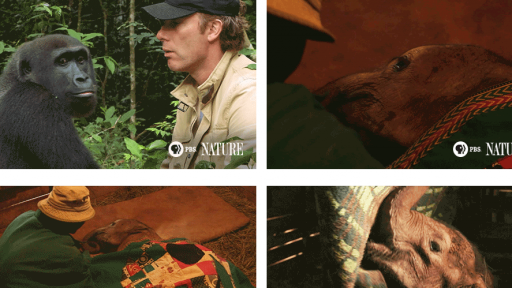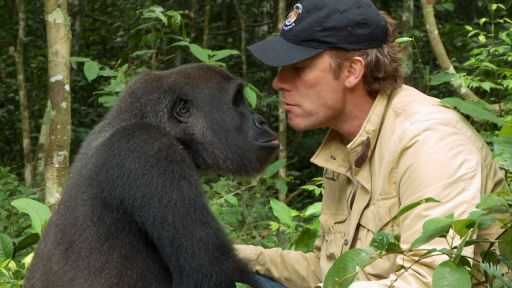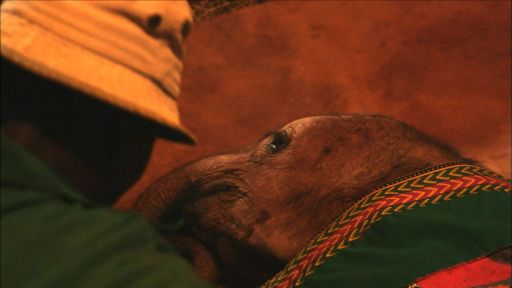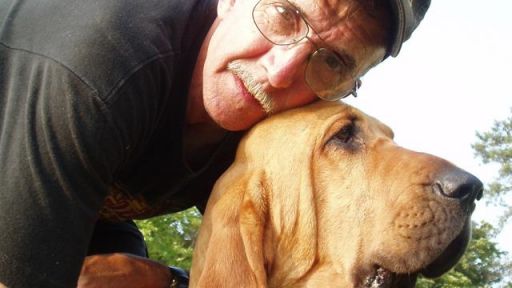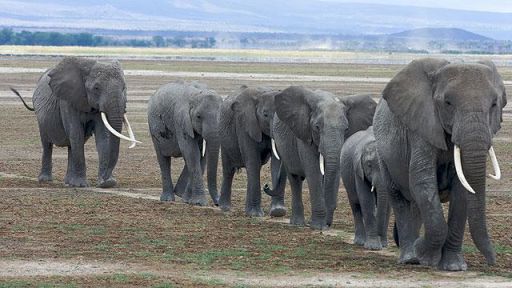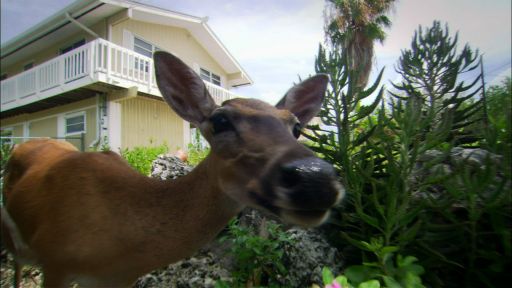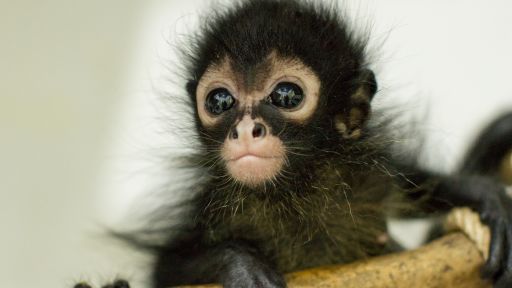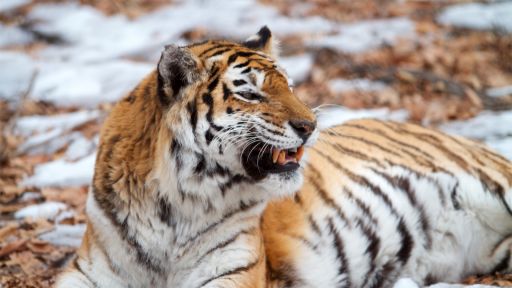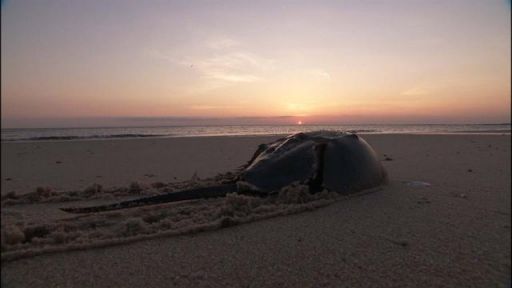TRANSCRIPT
♪♪ THOMAS: We hold the bonds of family and friendship as a sacred trust.
LUSICHI: The same care that we give to our human children is the same that we give to the baby elephants.
So it's like having a newborn baby.
ASPINALL: You develop trust with a gorilla the same way you develop trust with a human.
You give it unconditional kindness, unconditional love.
You treat it as an equal.
THOMAS: But can a truly wild creature feel affection for us?
We're about to put some very intriguing relationships to the test.
WOLHUTER: I'm going to get out now, and I'm just going to go lie down to the side here and then see how it plays out.
THOMAS: We are going to reunite some remarkable old friends... ASPINALL: I honestly didn't know how Kwibi was going to react.
THOMAS: ...and see what happens next.
♪♪ "Nature" is made possible in part by... the Arnhold Family, in memory of Clarisse Arnhold... Sue and Edgar Wachenheim III... the Kate W. Cassidy Foundation... the Lillian Goldman Charitable Trust... the Filomen M. D'Agostino Foundation... the Arlene and Milton D. Berkman Philanthropic Fund... Sandra Atlas Bass... Rosalind P. Walter... Bradley L. Goldberg Family Foundation.
By the Corporation for Public Broadcasting.
And by contributions to your PBS station from viewers like you.
Thank you.
THOMAS: As part of the natural world, humans harbor an instinctive desire to connect with nature, to bridge the gap between us and the creatures that live wild.
[ Elephant trumpets ] What types of relationships can we build with wild animals?
What kinds of bonds are possible?
And can animals respond in kind?
By exploring reunions between people and animals who have had deep emotional connections, we may discover how other species connect with us.
♪♪ ASPINALL: Come on!
Come on, then!
Come on!
THOMAS: Damian Aspinall, a maverick conservationist, is on the search for an old friend.
Kwibi the gorilla was born in captivity but was released back into the wild.
Now, after five years apart, Damian has traveled to Gabon in the hope of reuniting with him.
ASPINALL: Come on, then!
MAN: Whoo-whee!
ASPINALL: I went up and down the river, I guess, for about an hour or so, calling Kwibi.
Come on!
Come on, then!
But I was very intrigued to try and find him.
I wanted to see if he was doing okay.
Just as I was about to give up, he appeared.
THOMAS: But is this the gentle gorilla Damian once knew?
And will he remember his friend?
♪♪ Kwibi's journey began in rural England.
It's here that Damian Aspinall, a millionaire entrepreneur, runs Howletts Wildlife Park.
ASPINALL: [ Laughs ] THOMAS: This 90-acre animal sanctuary is open to the public, but Damian is reluctant to call it a zoo.
ASPINALL: Oh, yes.
The ethos of Howletts is so different to other institutions.
I mean, first of all, we absolutely put the animal first.
In most collections, you know, you'd have an animal that would be on show, but here, you know, they can be out the back and they wouldn't be on show.
But this is not about the public.
I don't give a damn about the public.
I give a damn about the animals.
THOMAS: More controversially, Damian sees all the animals in his care as friends.
ASPINALL: If you can reach a stage where you have a relationship like this with a wild animal, a black rhino, who has faith and trust and will effectively -- look -- fall asleep under my care and touch, you know, there's no greater compliment.
And she's not trained and she's not tamed or...
It's just love.
We love and nurture these animals, and then, wherever we can, try and return some of these animals back to the wild.
THOMAS: Damian's passion stems from an unusual childhood -- growing up in the wonderland of his father's private zoo.
♪♪ ASPINALL: Animals played a huge role in my life.
I grew up with animals all around me in the house, and I've had a sort of deep affection for animals as long as I can remember.
I was drawn to many animals, but gorillas are so human-like.
So it's probably possible to have a closer bond with a gorilla than it may be with a rhino or a tiger.
You develop trust with a gorilla the same way you develop trust with a human.
You give it unconditional kindness, unconditional love, and you don't try and be the dominant partner.
You treat it as an equal.
If they want to be left alone, they'll let you know.
If they're feeling very affectionate, they'll let you know.
THOMAS: Many of the gorillas at Howletts are the offspring of those Damian knew as a boy.
And as Damian grew up, he began to feel that keeping his animals friends in captivity was wrong.
ASPINALL: I've always felt in my heart that they have an absolute right to have their chance to live in the wild and their progeny to live free in the wild, as long as they're protected.
THOMAS: In 2003, Damian chose Kwibi and six others to be some of the first captive-born gorillas to attempt life in the wild.
ASPINALL: The first time I would've met Kwibi, he would've been a tiny little baby.
I had a good bond with Kwibi.
He was a sweet-natured gorilla, and that's half the battle.
THOMAS: But gorillas in the wild have a very different life.
For seven juvenile gorillas to make the leap from captivity to the wild would be an enormous challenge, and many people thought it couldn't be done.
ASPINALL: When we release the animals back into the wild, critics will say, "Oh, they haven't got a chance.
They've been, you know, domesticized."
Well, first of all, they're not domesticated at all.
These animals have a right to have their chance to live in the wild.
So people always underestimate them.
"Oh, they won't learn to live in the wild."
Well, how do you know they won't learn to live in the wild unless you try?
THOMAS: After doing all he could to prepare the gorillas for the wilds of Africa, the time came for Damian and his family to say farewell to Kwibi and his friends.
ASPINALL: You can wave them off, sweetheart, but you say your goodbyes now.
GIRL: Okay.
Bye-bye!
Bye-bye.
I've got to go.
ASPINALL: You know, I'm sad to see my friends go, but that's entirely selfish, and I'm actually much happier in my heart that they're out there.
We have really no right to keep them in captivity.
THOMAS: The gorillas were flown, 3,500 miles to the million-acre Batéké Plateau National Park in Gabon, West Africa.
The gorillas were greeted by a new team, appointed by Damian, to begin their introduction.
The last to step into this new and unknown world was Kwibi.
The gorillas were introduced slowly, starting out in a wooden house and spending their days in the forest until they were ready to leave for good.
Over the following years, Kwibi and his group grew strong and were adapting well to their new environment.
ASPINALL: We got daily updates.
And as he grew up, he got bolder and became more independent.
And whenever he was seen, he seemed healthy and happy.
THOMAS: But in 2010, the staff became concerned after Kwibi, who was now a 10-year-old territorial male, became aggressive and difficult to track.
ASPINALL: Dominant gorillas can become reasonably aggressive or very aggressive with humans, because they see them as a threat.
So he started to become quite tricky with some human contact.
THOMAS: When Damian heard the news, he traveled to Gabon.
ASPINALL: Come on!
Come on, then!
Come on!
THOMAS: He hadn't seen Kwibi for five years.
He had no idea if they could find him, and if they did, how Kwibi would respond.
After hours of searching... Kwibi appeared on the riverbank.
ASPINALL: I was apprehensive.
I honestly didn't know how Kwibi was going to react.
THOMAS: In case the situation erupts, a plan is put in place to distract Kwibi with food.
ASPINALL: Throw food if it kicks off.
THOMAS: After 5 years apart, Damian approaches Kwibi, unsure of what might happen next.
[ Kwibi purring ] ASPINALL: [ Speaking indistinctly ] I could hear his love gurgle... ...and I knew that he would be fine with me then.
All his mannerisms and vocalizations was one of someone so happy to see his old friend.
I was saying, "Lovely to see you, too, my old friend," letting him know that I was equally joyed to see him as he was me.
I remember sitting there with him, holding him and him holding me, and passing each other leaves.
It was lovely to see that -- that our bond was so strong.
It was all rather beautiful.
THOMAS: Then, Kwibi's wives approached.
ASPINALL: A very proud moment for Kwibi when he sort of introduced me to all his wives.
The female gorillas would have only come close if he was okay with it.
Otherwise, he would have kept them away.
Of course, when it was time to leave, it was very sweet when he was holding on to me.
Can you bring me over a sleeping bag?
THOMAS: But the reunion didn't end there.
ASPINALL: I got back into the boat and went for three or four miles back to camp.
You know, I knew he was following us, and that night, I could hear his calls.
I went for a swim in the morning.
There he was, at the edge of the riverbank, coming to see his old friend.
Kwibi!
Who's a lovely boy?
I can see you.
BEKOFF: I think the formation of these really strong, enduring social bonds across species has the same explanation as bonds within species.
It's the shared emotions.
It's the empathy.
It's the understanding what another animal is feeling.
It's the stimulus that's just deeply engrained in their head and their heart.
There's a heart issue there, because they would not show it to just anyone.
ASPINALL: I'll come and see you tomorrow, okay?
MORELL: People who want to have a more objective look at this particular interaction will accuse us of anthropomorphizing, of saying, "Well, you're suggesting that those animals feel the way that you do, and you have no evidence for that, because you're not those animals.
You really don't know how they feel."
I don't think anyone would say that the animals aren't feeling something.
But are they experiencing it in the way that we experience when we use the word "love"?
ASPINALL: Humans are often surprised by how much emotional capacity animals have.
But I think a lot of animals have the same range as humans.
There's as much a desire for a bond for a gorilla with a human friend as a human friend with a gorilla.
THOMAS: Damian's reunion with Kwibi appears to be based on a shared emotional connection.
But the idea that animals even have emotions was once controversial.
In the 1950s, Jane Goodall was one of the first scientists to build relationships with wild animals and also to show how those bonds could advance science.
Her studies of chimpanzees changed the way we thought about the emotional capacities of animals.
GOODALL: I found that it was really important to establish a trusting relationship with the chimpanzees when I first arrived, because, otherwise, I wouldn't have been able to observe them.
THOMAS: Jane spent weeks catching only fleeting glimpses of chimpanzees.
But eventually, she noticed one chimp who was unlike the others.
GOODALL: Fortunately, one of them, whom I named David Greybeard -- very distinctive, beautiful white beard, and for some odd reason, he was more trusting than the others, right from the beginning.
It was David who first began to allow me to approach more closely in the wild.
It was almost as though, in this way, he introduced me to his companions in the forest.
THOMAS: With access to the previously hidden world of chimpanzees, Jane began observing things no one had ever seen.
[ Chimpanzee cries ] GOODALL: As I got to know them, I began to describe the kind of behavior I saw.
It was so clear when they were sad, when they were content, and when they were angry.
They have emotions.
THOMAS: But when Jane reported her findings back to her university professors, she was met with ridicule.
GOODALL: I was told I'd done everything wrong.
First of all, I should have given the chimpanzees numbers rather than names, because that was more scientific.
Secondly, I couldn't talk about them having personalities and certainly not emotions, because those were unique to the human animal.
For all their scientific know-how, I knew that the professors were actually wrong.
THOMAS: Jane's relationship with David Greybeard and the chimps reconnected us with our closest animal relatives and shaped a new way of thinking.
MORELL: She gave chimpanzees their biographies, their lives, and it didn't just stop at chimpanzees.
It extended to every animal on the earth.
This whole area of animal minds and emotions that had really been forbidden, she opened it to all of us.
THOMAS: Jane's pioneering work broke down the barriers between wild animals and humans.
And today, people are pursuing relationships with even the most unlikely creatures.
In Zimbabwe, wildlife cameraman Kim Wolhuter wanted to get closer than anyone to the fastest mammal on earth -- the cheetah.
WOLHUTER: [ Grunting ] [ Panting ] ♪♪ I'm right there.
Seeing it from a perspective that nobody else has ever seen before, and I'm able to film it in a way that people can now actually feel what it's like to be a cheetah.
[ Cheetah growls ] THOMAS: Kim is a third-generation bushranger, who grew up surrounded by Africa's most iconic wildlife.
[ Elephant trumpets ] But as a filmmaker, he wanted to get even closer to animals to experience them as they are.
[ Birds chirping ] To be accepted by the notoriously skittish cheetah, Kim first had to find a way to build a relationship.
♪♪ WOLHUTER: Trust is crucial to any bond you want to develop with these guys.
Unless you can get their trust, you won't do anything, and to build that trust takes time.
The first six months is getting them sort of used to the vehicle.
The next six months is you're out of the vehicle.
The following six months is getting to actually start bonding with them.
And the last six months is pure and utter bliss, where you've got this amazing bond and you're just seeing everything as natural as it can be, because they're so trusting of you and they've got nothing to worry about.
THOMAS: No one had ever tried to film this close to a wild cheetah before.
And after 18 months of persistence, she allowed Kim into her world.
♪♪ WOLHUTER: I was getting some amazing shots.
Oh, it was great and it was just a lovely time.
♪♪ But then suddenly, out of the blue, she disappeared.
THOMAS: Kim spent months searching the Malilangwe Reserve... but there was no sign of her... until he got a call from one of the park rangers.
WOLHUTER: About six months later, one of the guides called on the radio to say that he had found this cheetah.
[ Engine starts ] THOMAS: When Kim finally caught up with her, he saw she'd been missing for good reason.
WOLHUTER: There's five of them.
THOMAS: It's been six months since Kim last saw her.
But even as a new mother, she accepts his presence.
WOLHUTER: If it wasn't for the mother, who I've worked with before, there's no ways I'd be allowed this close to these little guys, eh?
They're still a bit wobbly on their legs, huh?
THOMAS: It's exceptional to be allowed to get this close to cheetah cubs.
And now Kim wants to see how far the mother's trust extends.
WOLHUTER: I'm going to get out now and see how -- how they react, but I'm not going to walk straight towards them.
I'm just going to go and lie down to the side here and then see how it plays out.
Yeah, hopefully, the cubs will take their cue from her, and if she remains chilled, they will.
[ Door latches ] THOMAS: Kim is cautious.
Wild cheetahs can be highly protective of their young.
It could all change in an instant.
♪♪ In an attempt to appear unthreatening, Kim lies down.
♪♪ And in a sign of trust, so does the mother.
The cubs are now free to explore.
♪♪ WOLHUTER: This one little cub crawled between my legs, on to my stomach.
He's climbing all over me here.
And it was -- yeah, it was amazing.
This is a totally wild cheetah.
I just thought it was incredible.
Why did she let me do that?
It was insane.
It's a bond that just is so special.
It's -- It's incredible.
And the trust is -- Well, that's what it's all about.
It all comes down to trust.
It was incredibly special.
That's the reason why I do what I do.
It's those special moments.
THOMAS: This remarkable trust between one man and one wild predator was so complete that the mother extended it to her cubs.
Maternal protection is vital to the survival of animals, and the maternal bond so strong that without it, offspring can die.
MORELL: The fundamental bond in all mammals is between the mother and her child.
And so that's sort of where we begin to first experience feelings of love, as an attachment to our mother.
And then we want to go on in life and form similar attachments.
Emotions are certainly very essential to survival.
I don't see how animals can take care of their offspring if there's not a bond there.
THOMAS: When wild animals lose their mothers, humans can take on the role of surrogate parent.
How is this vital bond re-created?
And when the animal is introduced back into the wild, can the bond survive?
In Congo, the Jane Goodall Institute's Tchimpounga Chimpanzee Rehabilitation Center is home to over 100 orphaned chimpanzees, many born in the wild.
But they're all in desperate need of one thing -- a mother's love.
GOODALL: The orphan chimpanzees that come to our sanctuaries, they've been traumatized, they've lost their mothers, they're very often wounded.
It's absolutely essential that they do see their caregiver as a sort of surrogate mother.
ATENCIA: Allez.
Allez, allez, allez.
THOMAS: Dr. Rebeca Atencia is a vet with 15 years of experience caring for sick and orphaned chimpanzees.
Her aim is to raise and nurture them back to the wild.
ATENCIA: These mornings are just great.
To see how they go to the forest, they just walk through the savanna with us, playing and playing like in the wild, you know?
WOMAN: Hey.
THOMAS: Once they reach the forest playground, it's breakfast time.
In the wild, a chimp relies on its mother's milk until it's about 5 years old.
ATENCIA: We want to have healthy chimps, that they develop normal behavior like in the wild.
And for that, they need to play every day.
They need to enjoy.
They need to just be babies like they are now.
[ Chuckles ] THOMAS: Chimpanzees share 98% of their DNA with humans.
And just like us, one of the best ways to learn is through play.
WOMAN: Hey.
THOMAS: These little ones don't just need food and a safe place to learn.
There's one thing they're missing more than anything.
ATENCIA: At that time of their life, their mother is the center of their life.
It's everything for them.
GOODALL: The child is suckling, riding the mother's back, sleeping with her at night until the age of 5 -- 5 years.
So the mother-infant bond in chimpanzee society is absolutely, desperately important.
THOMAS: And for the caregivers, replacing that love is like becoming a mother themselves.
ATENCIA: This relationship is like a maternal relationship.
They feel that it's their support for the rest of their life.
If something is going to happen and that person is around, they feel at home because that person is part of their family.
THOMAS: One chimp Rebeca formed a special relationship with arrived at the sanctuary nine years ago.
She'd lost her parents to poachers and was severely malnourished.
ATENCIA: She had that lost look in her eyes.
She was confused.
We gave her a big mango, and she was eating and eating and eating and not stop eating.
Kudia, it means "to eat" in local language.
And we said, "Okay, we know already her name -- Kudia."
THOMAS: Kudia was raised in Rebeca's care day and night.
The two became inseparable.
ATENCIA: I just took her with me and I hug her.
She was lost for all this time and she was afraid of everybody, and suddenly, she found her adoptive mother, and it was me.
BEKOFF: The mother-infant relationship is one of the strongest and most highly evolved.
And there's some people who actually believe that that is the root of all the bonding and compassion and empathy that we see among animals.
They really believe that it's basically born, if you will, in the mother-infant bond.
MORELL: They're brought into this very loving environment and a person cares for them, feeds them, does everything for them that their mothers would have done.
The most natural sort of response is to be completely attached to that individual.
THOMAS: Rebeca and her cameraman husband, Fernando, spent seven years watching Kudia grow from strength to strength, and soon it was time to send her back to the wild.
ATENCIA: I was happy for her.
I knew that she would be great in the forest.
She will be like a real wild chimp.
But I was afraid of what is going to happen to her.
At the end, they are like your children.
They are part of your life.
THOMAS: Rebeca is heading out to a remote river island, which has been home to Kudia for the last two years, in the hope of a reunion.
As a vet, she wants to make sure Kudia is healthy and adapting to life in the wild.
And as a mother, she just wants to see her baby again.
ATENCIA: When you are in the life of somebody for so many years, you have this connection, and she's part of my life, you know, part of my family.
THOMAS: Living on the island keeps Kudia safe from poachers.
But she's far from alone.
The Congo's rivers and forests can be deadly.
There are 20 other chimps on Kudia's island... ...and the older males in particular can be aggressive.
ATENCIA: It is very possible that a chimpanzee in a specific situation can kill somebody.
A question of minutes.
Okay, we need to get ready, and we'll go to the chimps.
FERNANDO: Yeah.
Yeah, yeah, yeah.
THOMAS: Until they know it's safe, Fernando, Rebeca's cameraman husband, will take over the filming.
ATENCIA: We think that Kudia is around, that we are going to -- Fernando and me, we are going down to try to check if Kudia is here.
Back.
[ Speaking Spanish ] I am nervous.
I don't know what she's going to do.
How is she going to show that she knows me?
This bond that we started when she was young -- still there or not?
I don't know what is going to happen, and it's like a mystery.
Allez, allez, allez!
Kudia.
Allez, allez, allez.
[ Chimpanzees screeching ] THOMAS: Sure enough, there's movement up in the tree canopy.
The chimps know they have visitors.
And then a familiar face.
ATENCIA: Kudia.
♪♪ [ Kudia cheeping ] [ Chuckles ] ♪♪ THOMAS: It's a cautious first encounter.
After two years, does Kudia even want to reconnect?
ATENCIA: [ Speaking indistinctly ] THOMAS: But like any mother, Rebeca doesn't give up easily.
ATENCIA: Oh.
[ Chuckles ] [ Speaking Spanish ] ♪♪ Oh.
THOMAS: In her gentle way, Kudia leads Rebeca towards a clearing.
And then, acceptance turns to unmistakable affection.
ATENCIA: This is so natural, the way that she's just putting her hand on my shoulder.
She's just touching my skin, and she's so sweet in the way that she does that.
She's trying to show me that she has love.
THOMAS: Over an hour passes with Kudia seemingly content just to be close to Rebeca.
♪♪ ATENCIA: Kudia, what's happening with you?
♪♪ THOMAS: Convinced she's happy and healthy in her new wild paradise, it's nearly time to say goodbye.
ATENCIA: When you live with chimpanzees, and you are part of their group and you are part of their family, you start to see how close they are to us and how close we are to them.
You understand that they feel love.
Bye, Kudia.
Hoot, hoot.
♪♪ BEKOFF: We call it love between two humans, so there's no reason not to call it love between a non-human and a human.
THOMAS: Love, like all emotions, has a physiological foundation.
It originates in the brain.
BEKOFF: All mammals share the same structures in what's called the limbic system that underlie emotions.
There's a little almond-shaped structure called the amygdala.
We all have it, and it works to generate feelings of emotions across mammals.
THOMAS: We're not the only creatures whose brains are hard-wired for emotional lives.
And along with many mammals, we also share hormones released during social interactions that generate feelings of trust and love.
MORELL: The feeling of love is triggered by oxytocin, this chemical that's released in our bodies.
Other animals have it.
We may not be able to say exactly what they are feeling.
But is the chemical being expressed?
Yes.
THOMAS: If mammals share similar brain chemistry and are primed to have emotional lives like us, can we use this knowledge to help them?
[ Birds chirping ] It's dawn at Nairobi's David Sheldrick Wildlife Trust elephant orphanage.
[ Elephant snorts ] Head keeper Edwin Lusichi has spent 16 years rescuing orphaned elephants and sending them back to the wild.
LUSICHI: When the orphans come in the nursery, some of them come in in very, very poor conditions.
All their bodies malnourished.
They've not had food for a long time.
No water.
They're just seriously starving to death.
THOMAS: Edwin trained to be a priest, but when he came to the Nairobi nursery, he found his true calling and never looked back.
LUSICHI: I believe I have a special gift for working with elephants, because sometimes I really don't understand.
Some of the new elephants who come in, touching them or coming close to them for the first time, they just accept me.
THOMAS: Edwin's sensitivity to the animals is crucial.
Nearly 100 elephants are killed by poachers every day in Africa.
The babies not only witness the violent attacks on their families, they're often left having to fend for themselves.
When the rescued orphans arrive, they're often too frightened of people to accept the keepers' help.
So Edwin and his team have to find ways to build relationships with the elephants before they can treat them, care for them, and feed them back to health.
LUSICHI: The same care that we give to our human children is the same that we give to the baby elephants.
So it's like having a newborn baby.
[ Chuckles ] THOMAS: These babies don't just need to be nursed back to health physically.
[ Elephant trumpets ] LUSICHI: If their mothers were killed by poachers and they saw it happen, they are emotionally or seriously stressed and traumatized.
[ Speaking native language ] These elephants are family-oriented animals, so we have to be part of their family.
We have to show them love.
THOMAS: But how do you build a loving relationship with an elephant?
[ Elephant grunts ] LUSICHI: A lot of touch is showing affection, because they feel very, very comfortable when you touch them around.
Okay, there you are.
[ Speaking native language ] MAN: [ Laughs ] LUSICHI: When they suck on your fingers, they just feel very relaxed and very affectionate.
And being close to them and the positive thoughts about them helps them to heal from all the trauma, from all the stress they have encountered.
THOMAS: Over time, the elephants show signs that they are embracing Edwin and that a strong bond is forming.
LUSICHI: We do get love back from the elephants, because we see how they react to us -- wanting to sniff us everywhere, putting their trunk all around our body.
So we see the love coming back from the elephants.
[ Elephant snorts ] BEKOFF: Some people might find it surprising that animals who have been traumatized with humans still form bonds with them.
I think they're reading the human, and at some point, they're going, "I can trust you."
And then, once they form this trust, the doors are wide-open to forming a very strong, deep, and long-lasting bond.
THOMAS: These bonds of trust form the basis of their social skills, which will be essential when they reintegrate into wild herds.
One pioneering ethologist knows just how complex their social lives are.
In Amboseli National Park in Kenya, renowned wildlife biologist Cynthia Moss set out on what would become the longest continuous study of elephants.
MOSS: The project in Amboseli has been running since 1972.
We've been following over 3,000 elephants over that time.
We know every animal individually, and we follow individual lives from birth to death.
THOMAS: She soon discovered that elephants have one of the most highly developed social lives in the animal kingdom.
MOSS: In my studies, I've shown that there's five levels of social organization.
The base is the family unit, and that consists of females and their calves.
And then families have special relationships with other families, and those are called bond groups.
And then we have a clan, which is maybe made up of 10 or more families.
They're interacting and intermingling.
Often, there's a whole meeting and aggregating and breaking down.
It's called a fission-fusion society.
THOMAS: Cynthia also observed how excited they can be when family members reunite.
MOSS: When they come back together again, there is inevitably a wonderful greeting ceremony where they run together, you know, already trumpeting and rumbling and screaming.
And then they come together, and they click their tusks and entwine their trunks and spin around and urinate and defecate and everything, and that's what we call the greeting ceremony.
And that is just a very joyful thing.
THOMAS: Back in Nairobi, it's bedtime at the nursery.
The keepers sleep in with the orphans, spending each night with a different elephant, to prevent the orphans from becoming too attached.
For Edwin and the keepers, it's one long process of letting go.
LUSICHI: When the elephants graduate from the nursery and they go to be reintroduced back into the wild, yes, I miss them, but I feel a lot and a lot of joy, to see them go back into the wild.
And so that is the happiest moment in my life, despite the missing them.
THOMAS: Tomorrow, Edwin will embark on a journey that he hopes will reunite him with elephants he has missed ever since they left the orphanage.
One of them is Naipoki, who was just 3 months old when she was rescued.
LUSICHI: It was sad, it was painful.
And I concentrated a lot on just making sure that she's okay.
She was one of my favorites when she was in the nursery.
So friendly, very playful.
THOMAS: Another of his favorites, called Lempaute, was rescued 10 years ago from the roadside after losing her mother.
LUSICHI: She was a very, very cheeky elephant from the beginning.
Very, very cheeky and sometimes very naughty.
THOMAS: This is Tsavo East National Park in southern Kenya, home to 12,000 wild elephants.
It's here that Edwin's orphans are transferred to begin their reintroduction into the wild.
The orphans are growing up fast.
Naipoki, Lempaute, and the others are learning to rely less on the keepers and more on each other.
♪♪ SAUNI: When they are happy like now, they are healing psychologically, because when they came in, they were very much traumatized and they were given that love by the keepers.
So with their fellow orphans, they usually team up in groups of friends and they have some socializing and happy games.
So this will keep them busy.
They will forget their bad and terrible past and they get their life back.
THOMAS: Edwin has not seen his ex-orphans in over a year.
He's eager to reunite with Naipoki and Lempaute and discover whether they remember him.
LUSICHI: Very exciting.
I just want to see how they're progressing.
THOMAS: Now in Tsavo, he's just minutes away from seeing his old friends.
[ Engine shuts off ] [ Door opens, closes ] LUSICHI: Being reunited with the elephants, it is like meeting an old longtime friend or meeting an old longtime family.
That excitement is what I'm here for.
THOMAS: But now that Edwin's babies have grown up, will they remember him?
And now that they've bonded as a herd, will they care?
Edwin has spent his life working with them, and even he has no idea how they'll react.
But then... LUSICHI: Hello, Naipoki.
Hello, Naipoki.
How are you doing, Naipoki?
How are you?
Do you remember me?
It's good.
I can see you have big tusks now, becoming a big girl.
[ Naipoki grunts ] THOMAS: They've been apart for almost two years.
But it's clear Naipoki remembers.
LUSICHI: I hope you're fine.
[ Naipoki grunts ] You happy to see me?
I'm happy to see you.
Naipoki.
Don't put my head in your mouth.
Don't put my head in your mouth.
[ Chuckles ] THOMAS: Naipoki is showing all the signs of elephant happiness.
But then, an older female breaks up the party.
LUSICHI: Lempaute.
Lempaute.
Lempaute, don't.
Lempaute, Lempaute.
[ Elephant grunts ] THOMAS: It's another of Edwin's orphans, Lempaute.
She was always the unpredictable one.
And she hasn't seen Edwin in over a year.
LUSICHI: You remember me now?
THOMAS: Is this aggression, or could it be jealousy?
LUSICHI: You don't need to push.
You now remember me again?
You now want to be with me?
THOMAS: She wants to show Edwin a bit of love herself.
LUSICHI: Mm-hmm?
[ Blowing ] Now I can see you remember.
You are big, big, big, big.
I just feel so happy to be in the middle of all these elephants, all with their trunk around me, touching and smelling.
It's a sign that they remember me.
BEKOFF: It's a way of rekindling.
It's almost like a handshake in humans.
They're just taking in the odor.
They're taking in the sight and the sound.
It's like, "Wow, it's you.
Wow, it's really you."
MORELL: There is a long memory in those animals of their caretaker, of the person that they loved and trusted.
[ Elephant snorts ] And that just is not erased.
You know, that, I don't think, is probably ever forgotten.
LUSICHI: It is a big, big part of my family reunion.
And I'm happy to be reunited with them after some long time.
THOMAS: But this reunion is also a goodbye.
Soon, these elephants will bond with wild herds and leave the keepers for good.
Another farewell, two years ago, raised questions about the depths of an animal's emotional awareness.
Jane Goodall traveled to the Republic of Congo for the release of an orphaned chimpanzee -- Wounda.
GOODALL: She'd been very sick.
And I met her when she'd recovered from her sickness.
And it was decided to release her onto this beautiful Tchindzoulou Island.
It was very exciting.
THOMAS: During the one-hour boat ride, Jane did her best to soothe the distressed animal.
GOODALL: I was sitting just outside the cage, and she must have been, you know, "Where am I going?
What's happening?
Is this a boat?
This is new."
So I was kind of talking to her through the bars and trying to reassure her that it was going to be wonderful, and communicating, mostly silently.
THOMAS: The team arrived on Tchindzoulou Island.
With Jane was Wounda's caregiver, Rebeca.
GOODALL: Then, when we opened the bars of the cage and she came out, then climbed up on the top of the cage, we didn't know what she'd do.
And her caregivers that she knows are around her.
And then she turned and she looked directly into my eyes.
And then this extraordinary thing happened.
And it went on and on.
It wasn't just a quick embrace.
It was unbelievably moving.
We all were crying.
THOMAS: Though she had known Jane Goodall for just an hour, Wounda seemed to perceive something special in this singular human being.
GOODALL: One of the guys said, "How did Wounda know that that lady was the one responsible for all of this?"
Which, of course, she didn't know.
BEKOFF: If you want to say Wounda was saying thank you, that's fine.
Who knows, really?
But it was an indication of an incredible bond.
THOMAS: Wounda shows us that animals can initiate relationships with humans.
But what lies behind their motivation still captivates us.
GOODALL: What Wounda was saying to me with that embrace, none of us know.
I have absolutely no idea.
THOMAS: Even after decades of study, animals still evoke profound questions and wonder.
MORELL: We want to know what animals think and feel.
Now we have people who are going out there and they're answering these questions for us.
They're bringing back this information from this frontier.
It's a wonderful time.
THOMAS: And as our understanding develops, these provocative reunions may help us to see animals in a whole new light.
BEKOFF: I think these reunions are wonderful examples of these enduring bonds.
They're part of who the animal is.
They're in the animal's heart.
They really are.
ASPINALL: People are amazed that they're, you know, they're so emotional, that they have these -- this ability to love.
THOMAS: These reunions show how companionship, trust, love, and maternal bonds are characteristics that many species share.
Emotional connections may be as important to animals as they are to us.
♪♪ This program is available on DVD.
To order, visit shopPBS.org or call 1-800-PLAY-PBS.
♪♪ To learn more about what you've seen on this "Nature" program, visit pbs.org.
♪♪

